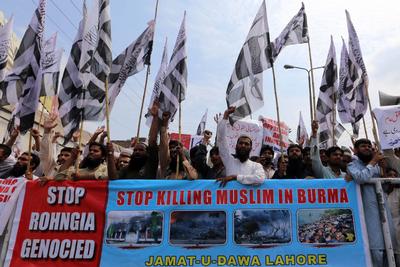The violence against the Rohingyas in Myanmar now threatens to affect the entire Muslim community in Myanmar — about 4 per cent of the total population. The threats to Myanmar’s security are taking a more complex form, and could begin to affect the peace and stability of the region as a whole.
The plight of the Muslims in Myanmar is being exploited by jihadist groups, their supporters and their sympathisers. First, the violence has triggered a massive outflow of Rohingya refugees to countries in South and Southeast Asia. Most of these refugees now live in terrible conditions. They feel marginalised and victimised by Myanmar and think a double standard is being applied by the international community — especially the United States — because it has failed to persuade the Myanmar government to address violence against Muslims. This feeling of abandonment is creating a pool of potential recruits for militant and radical groups.
Second, several radical groups operating in South Asia, Central Asia and Southeast Asia — including the Tehreek-e-Taliban Pakistan, the Afghan Taliban, the Islamic Movement of Uzbekistan (IMU), and the Jama’ah Ansharut Tauhid — are using the Rohingya issue to incite members of the Muslim community to carry out armed jihad. Bashir’s statements and visual imagery in social media platforms depicting the plight of the Rohingyas have heightened the zeal of those intent on conducting armed jihad in Myanmar.
A sizable Rohingya community lives in a part of Karachi in Pakistan, and some of its members were actively involved with the Rohingya Solidarity Organization, a militant group that ran a training camp in Myanmar–Bangladesh border areas before 9/11. There has been a re-emergence of Rohingya militant groups who are publishing radical materials in Arabic and Urdu that urge Muslims to join armed jihad in Myanmar. In the aftermath of an attack on Rohingya villages in June 2012, Tehreek-e-Taliban Pakistan, which is known for suicide terrorism, threatened to attack Myanmar to avenge crimes against the Muslim Rohingya. But the networking and operational capability of the Rohingya groups is still not known.
Abu Zar al-Burmi, a leader of the IMU, has also called for an armed jihad against Myanmar as the solution to the ‘occupation’ of Rakhine State. The IMU’s Jundullah media network is actively spreading radical materials on the internet, and the video of al-Burmi’s speech ‘The Lost Nation’ is a case in point: it targets not only Myanmar but China for its support for the Myanmar government.
The Rohingya issue is becoming a rallying point for radicals and militants. The calls for jihad in Myanmar have already been effective: in Indonesia there have been attempted attacks against the Myanmar embassy and mass demonstrations, while Malaysia witnessed a series of deadly clashes between Buddhist and Muslim expatriate groups from Myanmar. As a response the Malaysian police detained more than 900 Myanmar nationals.
The spreading violence in Myanmar might not make Southeast Asia a new jihadist front but there will be a significant resurgence in radical activities. The repression of the Rohingyas makes jihadist narratives more attractive to disaffected Muslims; it could trigger radicalisation and revive terrorist groups that have not been active for years.
Asia has long waited for Myanmar to open up and recent reform should be greeted with cautious optimism. But among Myanmar’s political and economic problems, the repression of its Muslim minority needs special attention. Communal and religious tensions in Myanmar are not a new phenomenon. Successive governments have marginalised minorities and negatively stereotyped different communities. There have been violent riots and forced migration. While the current government, led by the reformist President Thein Sein, is trying to address these problems, the deterioration of inter-communal relations is a major challenge. In many ways the success of Myanmar’s ongoing reforms will depend on how communal relations are managed and how tensions are diffused.
Iftekharul Bashar is Associate Research Fellow at the International Centre for Political Violence and Terrorism Research, S. Rajaratnam School of International Studies, Nanyang Technological University.
This article was first published here, in Counter Terrorist Trends and Analysis.

